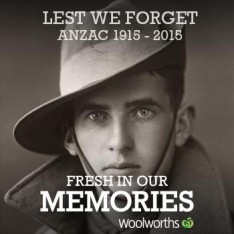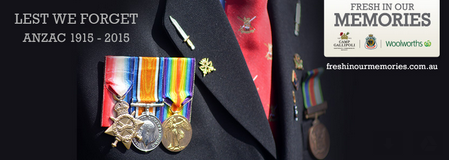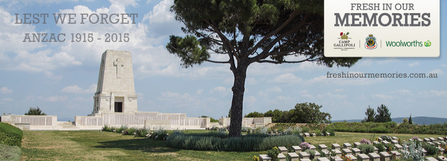Woolworths campaign aligned brand ‘too closely’ with Anzac Day to succeed say experts
 Marketing experts have said Woolworths ‘Fresh in our memories’ campaign generated such a huge public backlash because it aligned its brand far too closely to the memories of Anzac war heroes.
Marketing experts have said Woolworths ‘Fresh in our memories’ campaign generated such a huge public backlash because it aligned its brand far too closely to the memories of Anzac war heroes.
Today Carrspace, the experiential agency behind the campaign, has gone to ground referring all requests for comment to Woolworths and removing all links to the brand and Camp Gallipoli project from its website.
The supermarket has faced a barrage of criticism after it released the campaign on social media and was forced to pull down the campaign website after intervention by the Australian Government.
It was derided on social media as Woolworths faced accusations that it was exploiting Gallipoli and Anzac Day for commercial gain. Under the slogan ‘Fresh in our memories’ – a reference to its “Fresh food people” tagline – the campaign invited people to generate memories with the words ‘Lest we forget’ and the Woolworths logo underneath.
Jackie Crossman, chief executive of Crossman Communications said the campaign backfired because Woolworths tied Anzac Day “far too strongly to their brand”.
 “Anzac Day is sacrosanct and should be non-commercial,” she told Mumbrella. “There is a place for brands in Anzac Day but you need to be seen doing the right thing and there is a fine line.
“Anzac Day is sacrosanct and should be non-commercial,” she told Mumbrella. “There is a place for brands in Anzac Day but you need to be seen doing the right thing and there is a fine line.
“This one stepped over that line by being too heavily commercial and was made worse by tying their brand slogan and brand positioning to it.”
She added that the company “did the right thing” by apologising and withdrawing the campaign so quickly.
“Sometimes people can get it wrong, particularly when there is a fine-line in over-branding and under-branding. Obviously not everyone in Australia got upset over it but they have handled it well, they apologised and they’ve taken action accordingly,” she said.
Ben Davis, executive creative director of creative agency Smart, said brands should steer clear from clearly sensitive issues and blamed the “momentum” that has gathered in recent years of where brands have linked campaigns with the memory of Gallipoli.
“The decision to run with the campaign demonstrates a complete lack of introspection,” he said. “It is immediately apparent that the link between “Fresh memories’ and the ‘Fresh food people’ is insensitive.
 “I feel it is the culmination of all the momentum over several years that has been sweeping up brands to align themselves with Anzac. Woolies probably felt they had free reign.”
“I feel it is the culmination of all the momentum over several years that has been sweeping up brands to align themselves with Anzac. Woolies probably felt they had free reign.”
He said such has been the backlash that the trend of businesses tying their brand to Anzac Day “may have reached a tipping point.
“There needs to be a line about when there is a respectful association for the positive advancement of the legacy and brands where the main point of the association is for commercial profit.
“I don’t feel brands should be aligned with an event which is a sacred part of our history.”
In a blog posting on the subject last year Davis said: “It makes me feel a bit shabby for even being in the industry that seems so eager to use this as leverage, but maybe that’s just me? Probably.”
Comparison to the Woolworths campaign has been drawn with the crusade launched by UK supermarket Sainsbury’s last Christmas, which saw the brand re-enact a scene in the trenches from World War One.
While personally uncomfortable with the Sainsbury’s campaign, Davis said the execution of the TV ad was more “sensitive and sensibly implemented” and featured a donation message at the end of the execution.
VB’s Raise a Glass campaign
According to Barry Urquhart, managing director of Perth-based Marketing Focus, the Woolworths campaign “breached the fundamental tenets of good marketing”, adding it will take three to five years for the firm to recover.
He highlighted a major difference between the Woolworths execution and the TV ads created by VB for its Raise A Glass campaign.
https://www.youtube.com/watch?v=3hhrFy2Ucz0
“There is no association or relevance between a supermarket and Anzac Day,” Urquhart said. “It is part of Australian tradition to march in the morning, and go the pub in in the afternoon and reflect over a beer. That is why there is relevance and association for VB.
“What is not part of Australian tradition is to march in the morning and go to the supermarket.”
Woolworths, he added, has been fundamentally associated with the tagline “fresh food people” since the late 1980s, further heightening the overt commercial nature of the campaign.
“They grew market share from 17 per cent to 43 per cent on the back of Fresh campaign and so are intrinsically linked with it,” he added.
“This has exposed the brand to long term damage and will live fresh in the memories of Australian consumer’s for a long time. It will take a remedial campaign of three to five years to win people over.”
Former Ogilvy executive chairman Tom Moult said: “It’s as bad as if Coles had said “Down down in the trenches”. When I saw the Fresh in our memories line it made my toes curl. That was particularly crass.
“Woolworths obviously did the right thing in taking it down but I would stop apologising and now get on with it. Learn from it, but get on with it. The world moves fast and people will move on.”
The criticism has sparked debate over when and what brands should align to, with VB’s campaign also the subject of debate.
A spokesperson defended its campaign, stressing Raise A Glass is a partnership between RSL and Legacy and Carlton & United Breweries.
“Every aspect of the appeal/campaign is done with RSL and Legacy alongside. For example we take a concept or idea to the RSL and Legacy and continue that discussion every step of the way before launch,” she said.
“We acknowledge there is benefit for the brand, but we believe, and are proud of the fact, that there is more benefit for servicemen and servicewomen as the appeal has now grown to become one of the biggest contributors to veterans welfare in Australia.
“CUB donates $1m to the organisations every year as part of this appeal and our website encourages donations from people over and above that amount.”
Other brands have also sought to cash in while several rugby league clubs have issued commemorative shirts.
David said there is a difference between a sports club “which has a sense of community” and a business which ultimately exists to make money.
Target has also been selling a clothing range emblazoned with ‘Spirit of Anzac’ on the front. But a spokesman said it was the official retail partner of Camp Gallipoli and was making no money from sales with all proceeds going to charity.
Woolworths has declined to comment beyond the statement it issued last night it which it said it “regretted” that the campaign had caused offence.
Carrspace, the creative agency behind the campaign, declined to comment when contacted by Mumbrella.
Camp Gallipoli, of which Woolworths is a major sponsor, also declined to comment on the campaign itself but said it “will continue to partner with them to respectfully honour the memory of our war veterans”.
Steve Jones




A perfect example of UN-SOCIAL MEDIA.
User ID not verified.
3-5 years to recover?? More like 3-5 days. How quickly people forget these instant controversies is underestimated.
User ID not verified.
Why do companies who get things wrong only “regret” it? That’s the CEO trying to hide! Why not apologise for getting it wrong! Apologies are not too much to ask. Mealy mouthed PR i.e “regrets” just don’t wash.
User ID not verified.
The difference between the Woolworth campaign and VB for example, is the agency involved sought permission from the RSL to have an ANZAC association on their ad. It’s something that anyone with any experience in an agency knows. It’s not up to Woolworths to know this, it’s up to the agency. It’s like an agency informing a car client they can’t have a speeding car in their TV ad. It very basic stuff. If Carrspace had asked permission in the first place from the RSL, they would have been knocked back for sure.
They obviously didn’t. Beside that, as a creative director I’d have knocked this idea back straight away as bad taste. If I were the Woolworth client, I’d fire them straight away.
User ID not verified.
IMHO the issue is with the brand in question inserting their brand tag line into the ANZAC message. The use of “Fresh…” takes the reader away from the national tragedy and puts the brand as the focus. THIS is the problem.
User ID not verified.
I could have told them this campaign would fail. People are over Gallipoli and anzacs as demonstrated by the failure of Nine’s mini series, we are suffering commemoration fatigue. Any other companies or TV shows thinking about hopping on the Centenary bandwagon will be throwing money down the drain.
User ID not verified.
So @Carrspace shut down their Twitter account and pages on their website. Twitter back up now, while Woolworths execs mull over their 3-year deal. Time to change the name guys. [Edited under Mumbrella’s comment moderation policy]
User ID not verified.
I was going into Woolies at Westfield Burwood today. At the front of the store there was a large sandwich board with the close-up of the Digger’s face on it and “Lest We Forget”, but with no “Fresh” slogan. As we watched, a staff member came out and turned the sandwich board around, so that the Digger’s face was to the wall and the blank reverse faced outward.
Obviously management had got cold feet about the whole idea Anzac idea, but this seemed to be going a bit far.
They were still selling commemorative badges at the checkout, though.
User ID not verified.
Keep rolling in the lolz Woolies…
User ID not verified.
this is an awful blunder by woolies & carr, but i found the proliferation of photoshop “memes” in the immediate aftermath distasteful as well.
people excoriating woolies for disrespecting the anzacs mostly expressed themselves by disrespecting the anzacs – not cool. i saw one image with a picture of hitler and the macro “lest we forget” which imo is much worse than woolworths’ mistake, albeit by some amatuer hack rather than a huge recognisable brand.
User ID not verified.
As this has now made the lead story on smh.com.au…
http://www.smh.com.au/business.....ml8md.html
…there’s one reader comment that really sums it all up…
“If you look at the Carrspace totes amazeballs creative team you’ll note that there wasn’t a reality-checking baby boomer in there to say ‘hang on a minute…’
Just another reason why we need all generations in the workplace.
Commenter: Ian / Location:Sydney / Date and time: April 15, 2015, 12:58PM
User ID not verified.
With this and Louie, Mr Oliver gets it right.
https://www.youtube.com/watch?v=rG_7xur1iRc
User ID not verified.
Proof how Americanised this country has become. Woolworths’s utter disrespest in the chase of the holy dollar. VB beer (CUB) started using ANZAC in their advertising a few years back, they justify it by their association with the RSL and Legacy. In other words, our support comes at a price. Just another company run by upstarts who would have no idea of decency. For the record I stopped drinking VB and will no longer shop at Woolworths. An utter disgrace.
User ID not verified.
Check out the iconic Manly Wharf Hotel and you’ll see they have huge billboards posted out the front promoting an Anzac Day DJ party, with the same Digger likeness dominating the creative.
User ID not verified.
A good enough example of unsocial media.
User ID not verified.
The hype around ANZAC Day has mushroomed in the past decade… with two ever-present dangers as a result. The first is a sugar-coating and dumbing-down of complex history into simplistic, stereotyped narratives (check out pretty well anything on this subject on commercial television at the moment). The second is things like this – dumbass agencies diving snouts-first into the trough of hype and blowing it badly. Ordinarily, I’d laugh… but this just leaves a nasty, bitter taste all round.
User ID not verified.
What happens when you don’t consult with your PR team
User ID not verified.
There is dual responsibility here and the campaign looks like the result of a classic creative-client struggle. One brings a creative concept, the other says ‘great, but where’s the branding?’
The fact that they went so far over the line then seems to demonstrate a lack of persuasive, strategic counsel to the client and/or no playbook planning to test the idea by working through the worst case scenarios.
Lesson learned? We’ll see!
User ID not verified.
http://www.theshovel.com.au/20.....epartment/
User ID not verified.
Guys spare a thought for all that unloved “earned media” so tragically gone to waste.
I bet you $29.50 that someone will claim it on their cv in the future after all the furore dies down – “was responsible for a campaign with over a million dollars in earned media”
I’m betting there are a lot of people at Woolies who will forever remember Anzac 2015 with the phrase “Best we Forget”
User ID not verified.
The agency seems to be taking a beating but I wonder who signed this off. Surely they did not approve it without the clients sign-off.
User ID not verified.